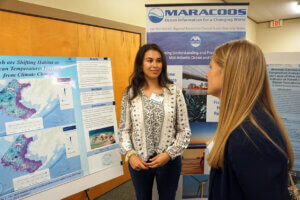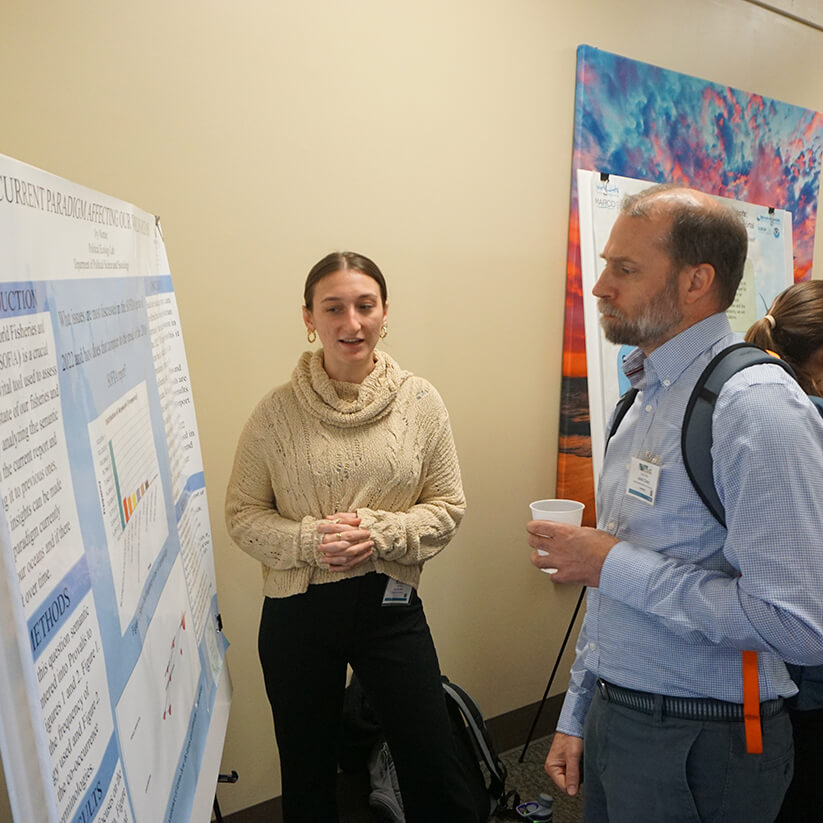
Three Monmouth University student researchers presented posters at the Sixth Annual Mid-Atlantic Ocean Forum, held May 13-15 in Lewes, Delaware. Hosted by the Mid-Atlantic Regional Council on the Ocean (MARCO), the Forum is the region’s premier annual event dedicated to ocean planning, gathering ocean professionals and stakeholders representing federal and state agencies, Tribal entities, marine industries, nonprofit research and advocacy organizations, and the public. The poster session was organized in partnership with the Mid-Atlantic Regional Association Coastal Ocean Observing System (MARACOOS).
Presenting were Diederik Boonman Morales, a rising senior in the Marine and Environmental Biology and Policy (MEBP) program; and May graduates Marie Mauro and Ivy Norton, who were also MEBP students. Watch their presentations below.
Microbial Community Composition Analysis in Coastal Lakes of New Jersey as an Indicator of Harmful Algal Bloom Formations
Student Researcher and Major: Diederik Boonman Morales, Marine and Environmental Biology and Policy
Faculty Mentor: Endowed Professor of Marine Science Jason Adolf, Department of Biology
Abstract: Coastal lakes are unique and important ecosystems, providing numerous benefits ecologically, and to the local communities. However, the health of these ecosystems is threatened and facing gradual degradation due to human activities, polluted water runoff, and Harmful Algal Bloom formations. HABs are complex phenomena that impact waterbodies and can have ecological and anthropogenic impacts. Genomics approaches of microbial community composition can improve our ability to monitor and understand HAB dynamics. Here, environmental DNA (eDNA) samples collected from three coastal lakes in 2021 and 2022 were analyzed by 16s meta-barcoding to examine the spatial and temporal distribution of microbial community composition. Through NMDS (Non-parametric Multi-Dimensional Scaling) ordinations and K-means clustering, the composition can be reduced to a single variable that can more easily be analyzed and spatially represented. A pipeline was created to seamlessly run the same process to analyze future samples. This study will contribute to the conservation and management of these critical ecosystems, providing a better understanding of the roles of microbial communities in coastal lake ecology.
Assessing Policy Measures for Managing Climate Induced Fish Habitat Shifts
Student Researcher and Major: Marie Mauro, Marine and Environmental Biology and Policy
Faculty Mentor: Rechnitz Family/Urban Coast Institute Endowed Chair in Marine and Environmental Biology and Policy Peter Jacques, Department of Political Science and Sociology
Abstract: Marine fisheries play a crucial role for both nutrition and economic prosperity in the United States. Anthropogenic climate change has been pressuring critical fish species to shift their habitats due to rising ocean temperatures. As a result, fisheries have to adapt which include relocating to alternative locations. The Magnuson-Stevens Act is the primary federal law that governs fisheries in the United States. The goal of this research was to analyze if the federal policies of the United States are adapted to accommodate the shifting habitat of fish which is necessary for maintaining the integrity of fisheries. A policy analysis method was employed to identify if federal policies have taken the shifting habitats of marine fish due to climate change into account with the most recent editions. Results indicate that climate change has not been directly addressed in most federal policies regarding fisheries management. The impacts of climate change already have induced changes in fisheries which is why it is necessary for federal policies to be updated.
Current Paradigm Affecting the World’s Fisheries
Student Researcher and Major: Ivy Norton, Marine and Environmental Biology and Policy
Faculty Mentor: Rechnitz Family/Urban Coast Institute Endowed Chair in Marine and Environmental Biology and Policy Peter Jacques, Department of Political Science and Sociology
Abstract: In the contemporary world, the status of our fisheries emerges as a paramount concern, besieged by overfishing, pollution, and dwindling biodiversity. This poster confronts the critical issue of fisheries mismanagement by investigating its core values. To answer the question, “What are the dominant values that manage world fisheries?” I use a quantitative content analysis of one of the more important international fisheries documents published every two years by the United Nations Food and Agriculture Organization, The State of the World’s Fisheries and Aquaculture (SOFIA Reports), using a proven dictionary from prior publications on this very issue in (Lobo and Jacques 2017 & Jacques and Lobo 2018. The publication’s data ended in the 2016 SOFIA report, and this work extends to the 2022 report to measure changing values across time. In particular, I analyze whether the economistic paradigm those prior papers found is still dominant, or if other paradigms have displaced the drive for economic growth. Thus, central to our inquiry is the exploration of alternative frameworks that challenge the economistic paradigm, emphasizing principles of sustainability, equity, and ecological resilience. By investigating and analyzing values in these documents, I can theorize the root causes of overfishing and environmental degradation. Early indications are that economism has not been displaced, indicating a need for a shift in policies and decision-making pertaining to fisheries management. Ideally one day we will have access to fisheries that are healthy and abundant while still being able to rely on them as a source of food around the world.

